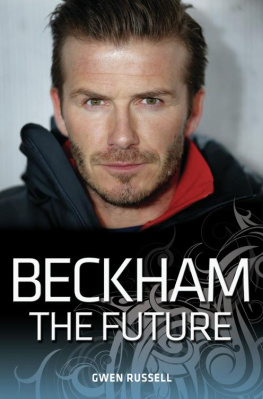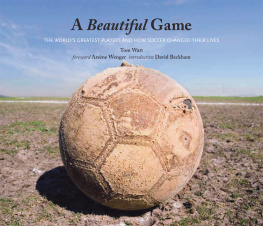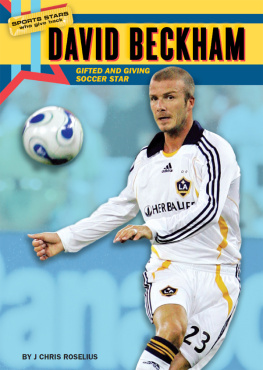T ed and Sandra Beckham were ecstatic: they had just had their second child, a son. The year was 1975 and, in early May, Sandra entered Whipps Cross Hospital in Leytonstone, east London where, on the second day of that month, she gave birth to David Robert Joseph Beckham, who was to be the second of three children Lynne, the oldest, was born a couple of years earlier and Joanna was yet to come along. And Ted, in particular, was delighted, for the arrival of a boy meant he had someone with whom to share his deepest and most abiding interest football.
All his life, Ted had worshipped Manchester United, one of the most famous football clubs in the world, and from the start he was determined his newborn would share his passion. At first, of course, no one had any idea quite how much his son was to fulfil his dreams, for the Beckhams came from humble origins: Sandra was a hairdresser and Ted a kitchen fitter, with no idea that their son was one day going to become one of the most famous men in the world. But what they would soon know was that baby Becks would become just as fanatical about the sport as his father was.
From a very young age, David was taken by Ted to a nearby park for a kickabout and the boy soon became so keen on this new pastime that he would practise alone for hours and hours, perfecting the dead-ball kicks that are now world famous. As an adult, David once revealed that some people thought his famous free kicks were a matter of luck: they were not, he said. They were the result of unending practice stints that dated back to those very early days.
Shortly after Davids birth, the family moved to Chingford, Essex, the home of his grandparents, where he was to spend the remainder of his childhood. Always an appealing little boy, David seemed to have only one drawback as far as football was concerned his height. The young David was actually quite short it was not until his late teens that he suddenly shot up to become the six-footer that he is now.
If David worried about his height, he didnt show it. Football became such a passion, so quickly, that it soon dominated his entire life. He would play wherever he could: not only in spaces just outside his familys houses, but also on the council pitches at Ainsley Wood School.
Away from the pitch, he was surprisingly shy. Its a quality hes retained to the present day: when he first met the then Victoria Adams, it was she who had to open the conversation.
Davids first school was Chase Lane Primary School and fellow schoolmates remember his passion for his chosen sport even back then. We were all very quiet at school, David especially, recalls Matthew Treglohan, who became one of Davids closest friends. I used to sit next to him in geography and art classes. He was very good at art, but was only ever interested in football. He wasnt even that bothered about girls then. A few of the kids shone through in football, but David was certainly one of the best.
But that is to understate the case. David was so good, so young, that his potential was spotted even before he was in his teens. It was while he was attending Chingford School that he took the first step towards what was to become his career. The local paper ran an ad reading: Wanted: Football stars of the future. (Ironically, in one of the many parallels that run throughout their lives, Victoria also kicked off her career when she spotted an ad for singers and dancers in a paper, although in her case she was in her late teens.) David got in touch and soon began playing for the Ridgeway Rovers in the Enfield Sunday League. The team, Davids local outfit, played in what is now called the Peter May Sports Ground in Wadham Road, Highams Park. It is fair to say he made his mark: in the course of three years, he scored over 100 goals, while also playing for another team, Chingford High, in the Waltham Forest District and Essex Under-15s.
A fellow school footballer, Nana Boachie, remembers it well. We were both 11 in our first proper football contest and David desperately wanted to start off with a goal, Nana says. As goalie on the opposing side, I wanted to keep a clean sheet. He just said, Well see, in that quiet voice of his. Just before half-time, we gave away a free kick just outside the area. David curled the ball into the top corner. It was impossible to save. He still remembers it.
So proficient did the young David show himself to be that top clubs began to notice him. He might have been only 11, but London clubs Tottenham Hotspur and Arsenal both began making enquiries about this extraordinarily talented young man. But, despite the fact that he lived just outside London, David wasnt interested. He knew who he wanted to play for and it wasnt a London club at all it was Manchester United. Ted Beckham was a stalwart fan of United and now his son was, too. He got teased about it, as well.
I used to take so much stick from my mates at school, David confessed. I had a couple of mates who were West Ham fans and a couple who were Tottenham or Arsenal fans. But I remember when we beat Arsenal 62, Sharpey [Lee Sharpe] scored the hat-trick. I used to wear my United shirt over my school uniform on my way to school, so I got a lot of stick, but I used to give a lot back.
It is noticeable, incidentally, that even then David was going to wear what he wanted, regardless of what anyone else thought. Indeed, David was to become interested in clothes very early on. But, to fund that habit and much else besides, he had to earn some money and so got a job as a potman at Walthamstow Dog Stadium, where he earned the princely sum of 10 a night. And it was at this young age that David got a taste of what was to come. In 1986, he took part in the TSB Bobby Charlton Soccer Skills final, which he won the youngest competitor ever to have done so. And that final took place at Old Trafford, Manchester Uniteds home ground, which meant that David first kicked a ball there when he was only 11. Funnily enough, the prize was also a little taste of what was to come: it was a two-week trip to Spain to train with Barcelona. Terry Venables was the manager and players included Mark Hughes, Steve Archibald and Gary Lineker.
Nor was that the only foretaste of what his later life was to be like. The competition at Old Trafford took place on the same day as a match with Tottenham Hotspur, and so there were plenty of Spurs fans present. Despite Davids tender years, the fans were not shy about making clear what they thought of his choice of team. All the Spurs fans were there and, as I was doing the dribbling in and out of the cones, they noticed that this was David Beckham of Essex, he said. The Spurs fans started singing and cheering, but then the announcer said I was a Man United fan. They booed me and I went in to a couple of cones.
It was fortunate that David was showing such promise on the pitch, because he certainly wasnt shining at school. Blessed with only limited academic ability, he clearly spent most of his time in lessons wishing he could get out of them, as evidenced by a number of tersely worded school reports dating from when he was 12. David is continually silly, which he cannot afford to be if he wishes to make progress, his French teacher wrote. I can only hope for a more mature approach.
The French teacher was not alone: none of the others seemed to rate Davids abilities very highly either. His behaviour has been extremely silly, thundered the doyenne of Home Economics. Could do a lot better.
David has ability but finds it difficult to concentrate, wrote his Humanities teacher. His attitude must improve immediately if he is to fulfil his potential.
Indeed, it would appear that the only field he was excelling in was the playing field but even here he came in for criticism. David has a natural ability to succeed at most sports, said his sports teacher, in a reflection that was to prove emphatically correct. But he should be careful of distractions, which affect his application.











